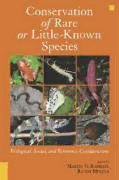
Conservation of Rare or Little-Known Species: Biological, Social, and Economic Considerations PDF
389 Pages·2007·4.28 MB·English
Most books are stored in the elastic cloud where traffic is expensive. For this reason, we have a limit on daily download.
Preview Conservation of Rare or Little-Known Species: Biological, Social, and Economic Considerations
Description:
Some ecosystem management plans established by state and federal agencies have begun to shift their focus away from single-species conservation to a broader goal of protecting a wide range of flora and fauna, including species whose numbers are scarce or about which there is little scientific understanding. To date, these efforts have proved extremely costly and complex to implement. Are there alternative approaches to protecting rare or little-known species that can be more effective and less burdensome than current efforts? Conservation of Rare or Little-Known Species represents the first comprehensive scientific evaluation of approaches and management options for protecting rare or little-known terrestrial species. The book brings together leading ecologists, biologists, botanists, economists, and sociologists to classify approaches, summarize their theoretical and conceptual foundations, evaluate their efficacy, and review how each has been used. Contributors consider combinations of species and systems approaches for overall effectiveness in meeting conservation and ecosystem sustainability goals. They discuss the biological, legal, sociological, political, administrative, and economic dimensions by which conservation strategies can be gauged, in an effort to help managers determine which strategy or combination of strategies is most likely to meet their needs. Contributors also discuss practical considerations of implementing various strategies. Conservation of Rare or Little-Known Species gives land managers access to a diverse literature and provides them with the basic information they need to select approaches that best suit their conservation objectives and ecological context. It is an important new work for anyone involved with developing land management or conservation plans.
See more
The list of books you might like
Most books are stored in the elastic cloud where traffic is expensive. For this reason, we have a limit on daily download.
